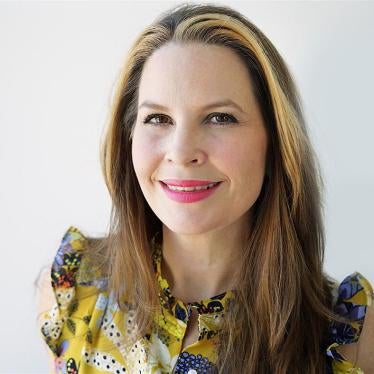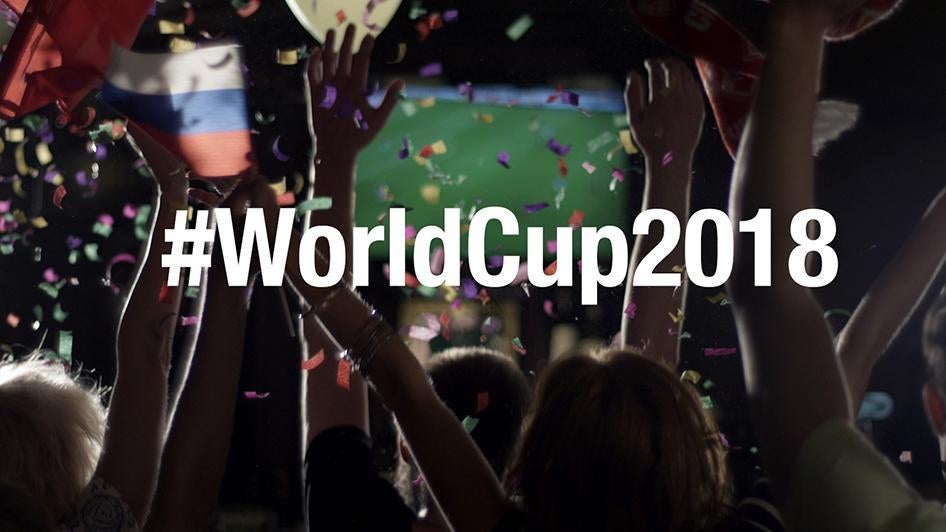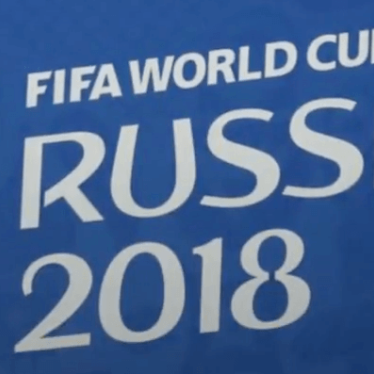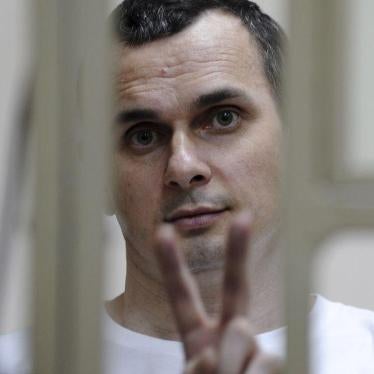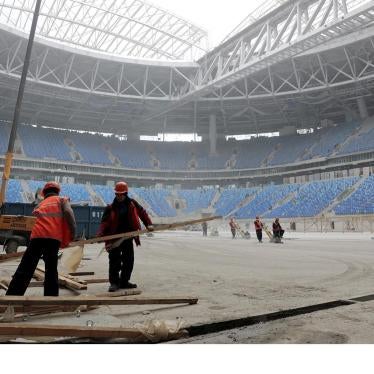The 2018 World Cup is winding down with memorable play, but for FIFA itself, this was a preventable own goal.
FIFA’s flagship tournament could have done something to relieve the worst human rights crisis in Russia since the Soviet era, but instead the football organization condoned many human rights violations, undermining its own policies. Russian President Vladimir Putin emerged as the big winner, using the games to sportswash his rule — to legitimize it by hosting a sporting mega-event.
FIFA adopted a Human Rights Policy in 2017, pledging to “go beyond its responsibility to respect human rights” by taking “measures to promote the protection of human rights and positively contribute to their enjoyment,” and it instituted a new program of labor inspections at construction sites. But from Russia’s escalating crackdown on peaceful critics to its unwelcoming anti-LGBT “propaganda” law to workers dying to build shiny new stadiums, this World Cup did little to counter Russia’s many rights abuses.
To deliver Russia’s World Cup, at least 21 workers died in stadium construction, according to Building Workers International. This is almost enough to field two teams. According to BWI in its June 2018 report “Foul Play,” “most of these deaths were because of falls from heights or because of heavy equipment falling on workers, tragedies that could have been averted if safety and health conditions were enforced.”
In another low, North Korean forced laborers constructed a World Cup stadium. In an article titled “The Slaves of St Petersburg,” the investigative magazine Josimar documented that at least 110 North Koreans worked at the Zenit Arena in St. Petersburg, one of the venues for the 2018 World Cup Finals. “International experts describe the workers from North Korea as both slaves and hostages. One North Korean worker was found dead in a storage container outside the stadium.”
North Koreans working in Russia qualify as forced labor because the North Korean labor suppliers must send the vast majority of hard currency the workers earn back to Pyongyang (in violation of U.N. sanctions). After these revelations, FIFA President Gianni Infantino said that “North Korean workers are no longer being used” — but he did not reveal what actually happened to the workers who helped build the St. Petersburg stadium, and whether they were ever fairly compensated for their work.
Consistent with these findings, Human Rights Watch documented wage-cheating, unsafe conditions and exploitation in construction of stadiums and other World Cup-related sites in our 2017 report, Red Card. At one point, our researcher was detained by police outside the Volgograd stadium, putting an end to his research on worker conditions.
Beyond worker abuses, the World Cup gave one of Russia’s worst rights violators, the Chechen ruler Ramzan Kadyrov, a global platform to launder his reputation. Russia’s Chechnya province is home to some of the country’s worst human rights violations. Kadyrov is known to publicly condone honor killings, order house-burnings and openly threaten journalists and human rights defenders. One of those threatened was later killed, and there has been no justice for her murder.
In January, Oyub Titiev, Grozny director of Memorial, the last remaining human rights group that works openly in Chechnya, was arrested on trumped-up charges. A few weeks later, FIFA announced that Chechnya would be a World Cup training site. During the tournament, Kadyrov, predictably, publicly embraced star players including Mo Salah to burnish his own reputation by posing as just another lovable football fan.
“Mohamed Salah is an honorary citizen of the Chechen Republic! That’s right!” Kadyrov wrote in a social media post. Salah later distanced himself from Kadyrov. As the AP’s John Leicester put it, “Using the appeal of sports, especially football, to make themselves and their regimes look good is one of the oldest tricks in the despots’ handbook.”
And then, there are LGBT rights. In 2017, Kadyrov presided over a horrific and unprecedented anti-LGBT purge, as Chechnya’s security forces rounded up men perceived to be gay, tortured them, and forcibly disappeared some. Kadyrov denied it, proclaiming in an interview with HBO: “We don’t have such people here. We don’t have any gays … To purify our blood, if there are any here, take them.” In a later interview, he pretended he was unable even to pronounce the word “homosexual.”
FIFA’s new Human Rights Policy and its statutes now ban discrimination, including on the basis of sexual orientation. Yet Russia’s anti-gay “propaganda” law penalizes LGBT activism or even any public information that asserts equality between same-sex relationships and heterosexual relationships.
How could this possibly make gay fans, fans, families and athletes feel welcome? FIFA could have pressed Russia to repeal its anti-gay law. But there’s no evidence that it did, even though at past World Cups, FIFA did not hesitate to call for the repeal of laws that it felt would have a negative impact on the games. That makes it both a shame and a missed opportunity to make a difference for basic human rights through the World Cup’s presence in Russia.
So, if you enjoy the World Cup, why should it matter if laws discriminate against LGBT people, workers die, and human rights conditions are abysmal?
The World Cup at its best is about celebrating human achievement and potential. Fans, sponsors and the public are increasingly saying that ugly human rights abuses should have no place in sport. Twenty-one dead workers is too high a price. Indeed, there is no need for even one construction worker to die to deliver FIFA’s World Cup.
Countries hosting the World Cup gain global prestige, which gives FIFA and fans leverage to demand that hosts uphold basic human rights and human dignity — inside and outside of the stadiums.
This is vital because after Russia, the World Cup moves to Qatar, now constructing an archipelago of stadiums at an estimated cost of $200 billion.
Qatar has moved the next World Cup to the fall so that football players do not risk their health in the tiny Gulf country’s extreme summer heat. Yet Qatari authorities still have failed to adopt adequate measures to protect the estimated 800,000 migrant construction workers building the infrastructure for Qatar’s 2022 World Cup from working during periods of extreme heat and humidity.
It’s time things change. In June, with the backdrop of Russia’s and Qatar’s World Cups, a new Centre for Sport and Human Rights was set up in Geneva to address systemic human rights problems around major sporting events. The center’s mission statement describes its “vision of a world of sport that fully respects human rights.”
FIFA needs to assess what happened in Russia and to make sure it uses its new human rights policy to protect the rights of both workers and fans. And sports fans and sponsors should tell FIFA that there should never again be a World Cup that costs lives to stage.
----------------------------------
Minky Worden is the director of global initiatives at Human Rights Watch, and the editor of “China’s Great Leap,” a book on human rights and the Beijing Olympics. Follow her @MinkysHighjinks.
